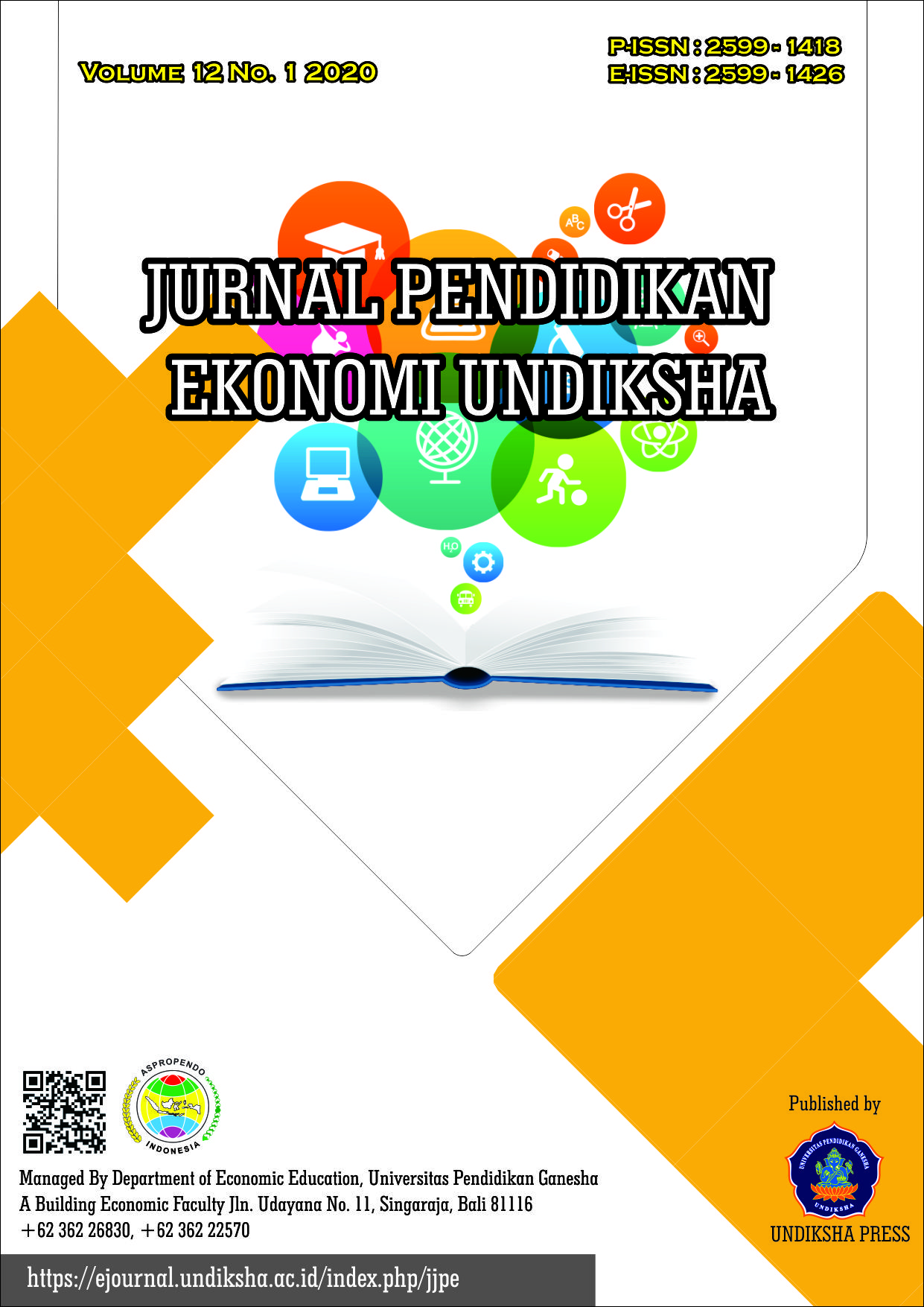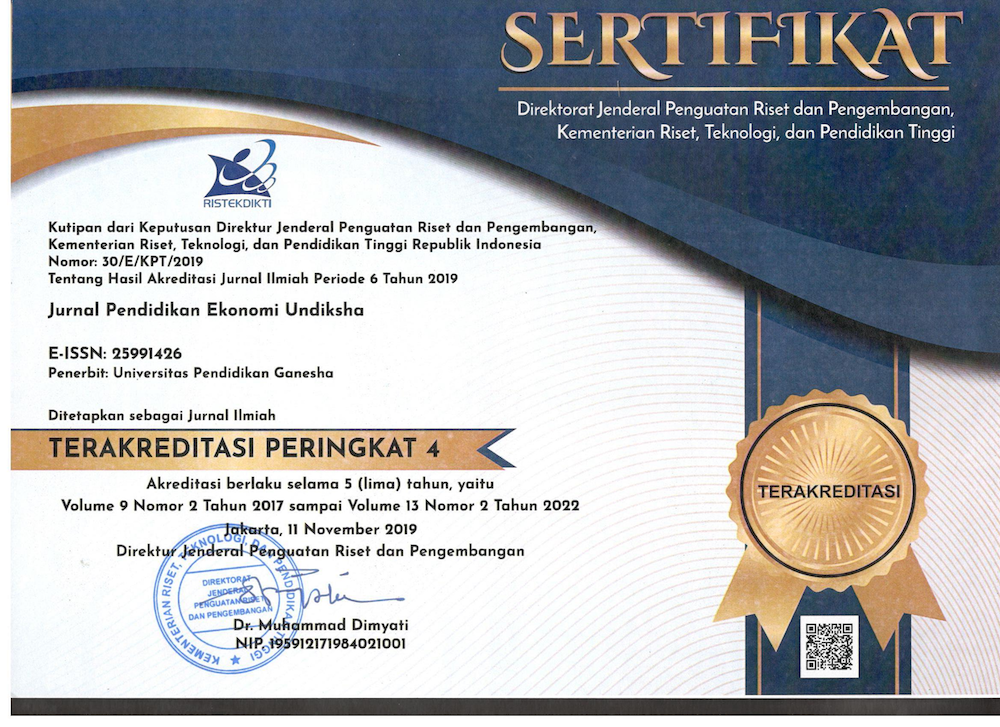Studi Komparasi Metode Pembelajaran dalam Meningkatkan Literasi Keuangan di Masa Pandemi Covid-19
DOI:
https://doi.org/10.23887/jjpe.v12i1.25314Keywords:
Financial literacy, Game Based Learning, Online learningAbstract
The COVID-19 pandemic attack the economy and society. Economic activity collapses, the economic activity of the community experiences a setback due to many socio-economic restrictions. The logic of economic action from consumption and production works out of reason. Financial literacy cannot be separated in life. Financial literacy is an important skill that can be used to make economic decisions. Many pre-pandemic programs have been carried out to increase Financial Literacy. In the field of education students have been taught to be more sensitive in applied economics, only an evaluation tool for the effectiveness of methods that have not been accommodated. Researchers examine the condition of financial literacy at university level students. Based on the learning methods applied during the pandemic, using the score collection method. The analytical method used in this study was an independent t-test based on the teaching method implemented, respondents were divided into 2 group, 46 students in online learning classes and 46 students in game based learning classes. The results showed that the learning method at home learning was not significant enough to develop individual financial literacy.
References
Akmal, H., & Saputra, Y. E. K. A. (2016). Analisis tingkat literasi keuangan. Jebi (Jurnal Ekonomi Dan Bisnis Islam), 1(2), 235–244. Retrieved from http://journal.febi.uinib.ac.id/index.php/jebi/article/view/37
Chang, C. C., Liang, C., Chou, P. N., & Lin, G. Y. (2017). Is game-based learning better in flow experience and various types of cognitive load than non-game-based learning? Perspective from multimedia and media richness. Computers in Human Behavior, 71, 218–227. https://doi.org/10.1016/j.chb.2017.01.031
Jagušt, T., Botički, I., & So, H. J. (2018). Examining competitive, collaborative and adaptive gamification in young learners’ math learning. Computers and Education, 125(June), 444–457. https://doi.org/10.1016/j.compedu.2018.06.022
Kerr, G. (2016). Financial Literacy Outcome Indicators. Prosper Canada
Li, Q., Guan, X., Wu, P., Wang, X., Zhou, L., Tong, Y., … Feng, Z. (2020). Early transmission dynamics in Wuhan, China, of novel coronavirus-infected pneumonia. New England Journal of Medicine, 382(13), 1199–1207. https://doi.org/10.1056/NEJMoa2001316
Lichtenwalter, S., & Baker, P. (2014). Teaching About Oppression Through Jenga : A Game- Based Learning Example For SociaL. Journal of Social Work Education Teaching. (December), 37–41. https://doi.org/10.5175/JSWE.2010.200800080
Martin, F., & Noonan, D. (2010). Synchronous technologies for online teaching. 2010 International Conference on Technology for Education, T4E 2010, 1–4. https://doi.org/10.1109/T4E.2010.5550062
Murniatiningsih, E. (2017). Pengaruh Literasi Ekonomi Siswa, Hasil Belajar Ekonomi, Dan Teman Sebaya Terhadap Perilaku Konsumsi Siswa SMP Negeri di Surabaya Barat. Jurnal Ekonomi Pendidikan Dan Kewirausahaan, 5(1), 127–156. https://doi.org/p-ISSN 2303-324X, e-ISSN 2579-387X
Nurfitriyani, A. (2019). Ini Sektor yang Jadi Penopang Utama Pertumbuhan Ekonomi Indonesia. Retrieved from wartaekonomi.co.id website: https://www.wartaekonomi.co.id/read262778/ini-sektor-yang-jadi-penopang-utama-pertumbuhan-ekonomi-indonesia
Ramaci, T., Barattucci, M., & Ledda, C. (2020). Social Stigma during COVID-19 and its Impact on HCWs Outcomes. 1–13.
Ramage, T. R. (2002). Parkland College The “No Significant Difference” Phenomenon: A Literature Review The “No Significant Difference” Phenomenon: A Literature Review. Dr. Thomas R. Ramage Scholarship, Paper 1. Retrieved from http://spark.parkland.edu/ramage_pubs/1
Risqi, M., & Saputra, U. (n.d.). LexiPal : Design , Implementation and Evaluation of Gamification on Learning Application for Dyslexia. 131(7), 37–43.
Rodrigues, L. F., Oliveira, A., & Rodrigues, H. (2019). Main gamification concepts: A systematic mapping study. Heliyon, 5(7), e01993. https://doi.org/10.1016/j.heliyon.2019.e01993
Satrio, Y. D. (2012). Analisis financial literacy mahasiswa Fakultas Ekonomi Universitas Negeri Malang. (Doctoral dissertation, Tesis, Program Pasca Sarjana Prodi S2 Pendidikan Ekonomi Fakultas Ekonomi Universitas Negeri Malang). Universitas Negeri Malang.
Wardoyo, C., Dwi Satrio, Y., & Ma’ruf, D. (2020). Effectiveness of Game-Based Learning – Learning in Modern Education. KnE Social Sciences, 2020(2001), 81–87. https://doi.org/10.18502/kss.v4i7.6844
Zainuddin, Z., Shujahat, M., Haruna, H., & Chu, S. K. W. (2020). The role of gamified e-quizzes on student learning and engagement: An interactive gamification solution for a formative assessment system. Computers and Education, 145, 103729. https://doi.org/10.1016/j.compedu.2019.103729
Zhang, Y., & Ma, Z. F. (2020). Impact of the COVID-19 pandemic on mental health and quality of life among local residents in Liaoning Province, China: A cross-sectional study. International Journal of Environmental Research and Public Health, 17(7). https://doi.org/10.3390/ijerph17072381





